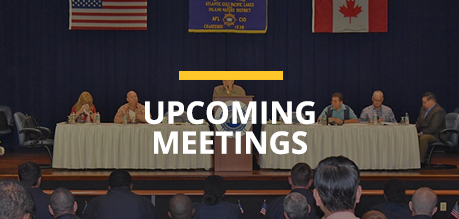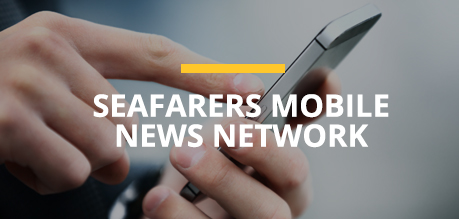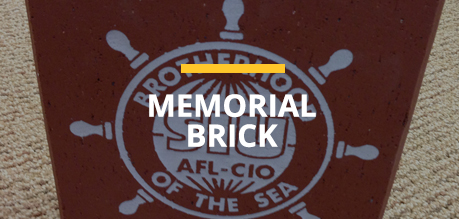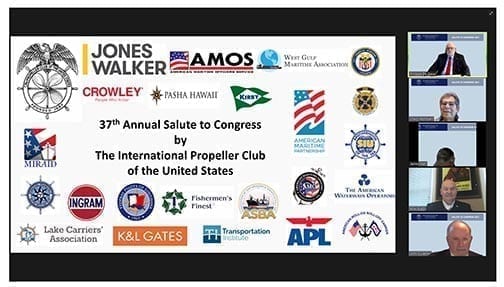The global COVID-19 pandemic continues affecting most if not all parts of life, and it prominently figured in the respective remarks of this year’s Salute to Congress honorees.
The annual event, sponsored by the Propeller Club of the United States, is considered one of the maritime industry’s most prestigious gatherings. This year’s honorees are U.S. Rep. Peter DeFazio (D-Oregon) and Rear Adm. (ret) Mark Buzby, who recently retired as head of the U.S. Maritime Administration. They were recognized in a well-attended Zoom meeting April 1. Answering a question from the Seafarers LOG, DeFazio said the pandemic has underscored the importance of the U.S. maritime industry.
“People are waking up after this COVID crisis and saying, ‘Wait a minute, we don’t have N-95 masks? We don’t have gowns? Why?’ Because it’s all been offshored,” De- Fazio said. “Then they realize we’re having trouble moving the goods because we’re depending on foreign carriers. We need to be much more self-sufficient, including having a very robust maritime industry, and not just a one-way maritime industry (that only imports goods).”
DeFazio said that maintaining a strong U.S.-flag fleet with American crews “is about really good jobs, it’s about national security, and it’s absolutely critical to the nation. In a time of crisis, are we going to call on the Chinese to transport our troops?”
He expressed great confidence in the new administration and stated that, after successfully fending off attacks on the Jones Act in recent years, “now we’re going to build on it.”
The congressman also said America must immediately move forward with rebuilding its infrastructure.
“The world is leaving us behind in the dust or the concrete and the leaking water mains, or the obsolete ports that can’t handle [newer ships],” he said. “There are ways to fund this…. We’ve got to get this done.”
Buzby, speaking with a World War II U.S. Merchant Marine poster directly behind him, said that when the pandemic began more than a year ago, “I don’t think one of us knew what direction it would take…. The rapidity … was eye-watering for us all. But a great team backed me up at MARAD. We came together early in all of this and [identified] agency’s role. Sitting back was not an option.”
He applauded all segments of the industry for quickly getting together (usually via phone or video conference) “to share what we knew and what we could do. What evolved was a tremendous forum that allowed information to be shared in real time. We shared resources in a way that I think really cut through red tape to an extent I have not seen before.”
Buzby repeatedly credited maritime unions for their efforts, and said the overall response to the pandemic-related challenges “shined a good light on how strong and close our industry is and how well we work together. This was a level of cooperation I’ve never seen before.”
Both he and DeFazio pointed out that the maritime industry didn’t get any financial relief from the various packages enacted by the previous or current congresses.
“Yet we were able to keep the goods flowing and never stopped, when other industries were brought to their knees,” Buzby said. “That was happening on the backs of people working on the piers and working on ships. They have the same steely determination on their faces today” as the one seen on the World War II poster.
Buzby also credited former Secretary of Transportation Elaine L. Chao for being “a stalwart” in defending and promoting the U.S.-flag maritime industry while he served at MARAD.
###






Comments are closed.